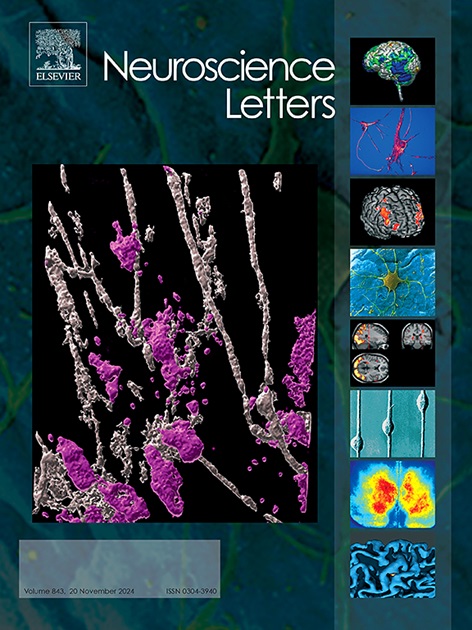Middle-aged females are resistant to LPS-induced learning deficits: Sex comparison
IF 2.5
4区 医学
Q3 NEUROSCIENCES
引用次数: 0
Abstract
Preclinical data have repeatedly shown learning and memory disruption following administration of the bacterial endotoxin lipopolysaccharide (LPS). Normal aging is reported to enhance vulnerability to LPS-induced cognitive impairments. However, a limitation is the primary use of male subjects. Recent evidence indicates sex-related differences in vulnerability to LPS-induced cognitive deficits [1], [2], with young females showing resilience. Whether middle-aged females are susceptible to LPS-induced cognitive impairment is unknown. The current experiment compared associative learning in young and middle-aged male and female C57BL/6J mice following a systemic LPS challenge. While LPS impaired acquisition of the two-way active avoidance conditioning task in adult and middle-aged males, females’ learning was unaffected. The sex difference in LPS-induced cognitive impairments appears unrelated to responsivity to LPS, as males and females mount a comparable sickness-like response. Additionally, relative to males, females produce higher brain levels of interleukin-6 (IL-6) and comparable splenic IL-6 levels following LPS. These data demonstrate that female resilience to LPS-induced learning deficits persists into middle age, whereas males are vulnerable as both young and middle-aged adults. Our findings confirm the importance of considering sex as a biological variable and extend the existing literature by evaluating sex-related responsivity to LPS in middle-aged males and females.
中年女性对lps诱导的学习缺陷有抵抗力:性别比较。
临床前数据反复显示,在使用细菌内毒素脂多糖(LPS)后,学习和记忆受到破坏。据报道,正常的衰老会增加对脂多糖诱导的认知障碍的易感性。然而,一个限制是主要使用男性受试者。最近的证据表明,对lps诱导的认知缺陷的易感性存在性别差异[1,2],年轻女性表现出适应力。中年女性是否容易发生脂多糖诱导的认知障碍尚不清楚。本实验比较了中青年雄性和雌性C57BL/6J小鼠在系统性LPS刺激后的联想学习能力。虽然LPS对成年和中年男性双向主动回避条件反射任务的习得有影响,但对女性的学习没有影响。LPS诱导的认知障碍的性别差异似乎与对LPS的反应无关,因为男性和女性会产生类似疾病的反应。此外,与男性相比,女性在LPS后产生更高的脑白细胞介素-6 (IL-6)水平和相当的脾IL-6水平。这些数据表明,女性对lps诱导的学习缺陷的适应能力持续到中年,而男性在年轻和中年时都很脆弱。我们的研究结果证实了将性别作为一个生物学变量的重要性,并通过评估中年男性和女性对LPS的性相关反应扩展了现有文献。
本文章由计算机程序翻译,如有差异,请以英文原文为准。
求助全文
约1分钟内获得全文
求助全文
来源期刊

Neuroscience Letters
医学-神经科学
CiteScore
5.20
自引率
0.00%
发文量
408
审稿时长
50 days
期刊介绍:
Neuroscience Letters is devoted to the rapid publication of short, high-quality papers of interest to the broad community of neuroscientists. Only papers which will make a significant addition to the literature in the field will be published. Papers in all areas of neuroscience - molecular, cellular, developmental, systems, behavioral and cognitive, as well as computational - will be considered for publication. Submission of laboratory investigations that shed light on disease mechanisms is encouraged. Special Issues, edited by Guest Editors to cover new and rapidly-moving areas, will include invited mini-reviews. Occasional mini-reviews in especially timely areas will be considered for publication, without invitation, outside of Special Issues; these un-solicited mini-reviews can be submitted without invitation but must be of very high quality. Clinical studies will also be published if they provide new information about organization or actions of the nervous system, or provide new insights into the neurobiology of disease. NSL does not publish case reports.
 求助内容:
求助内容: 应助结果提醒方式:
应助结果提醒方式:


